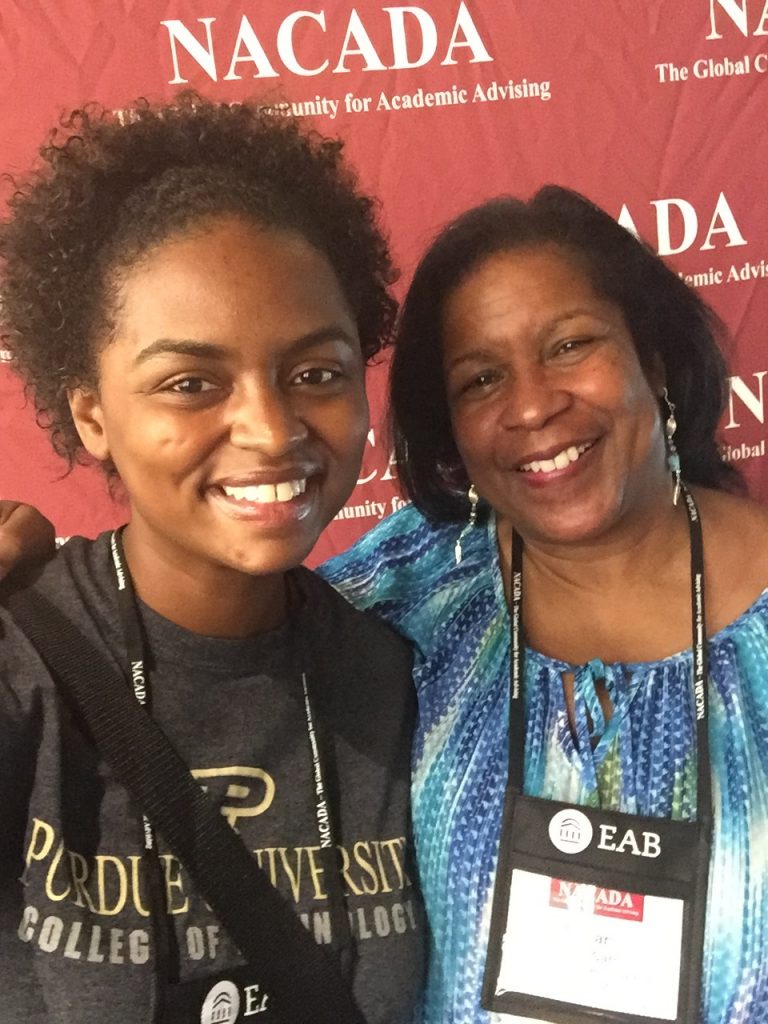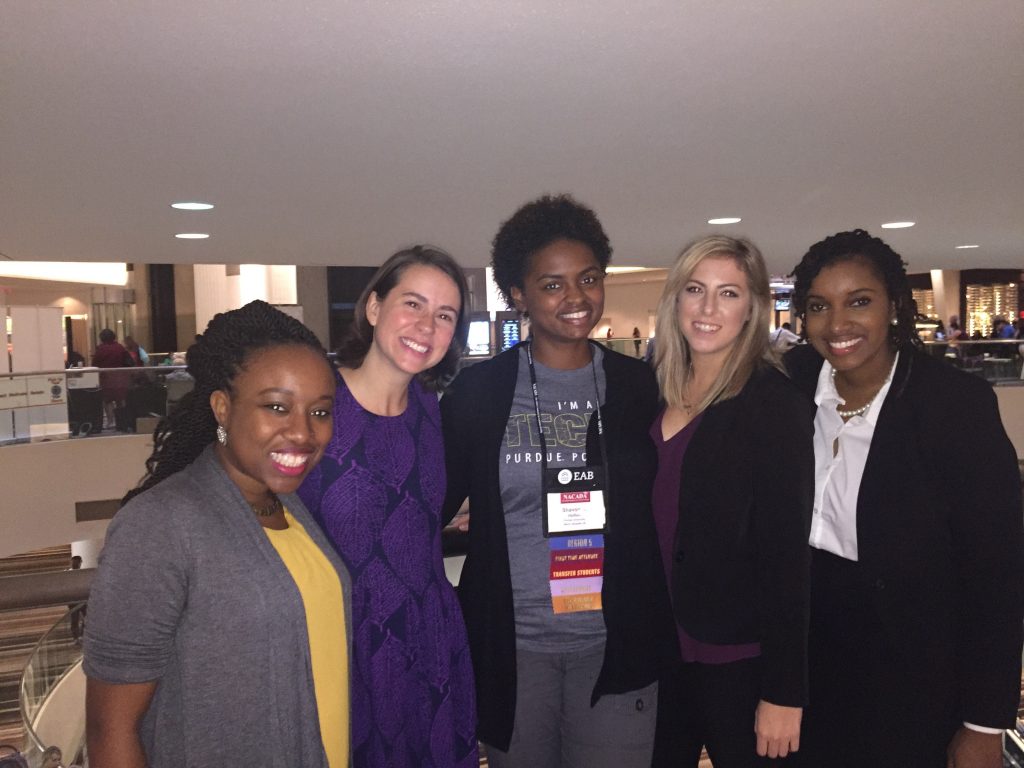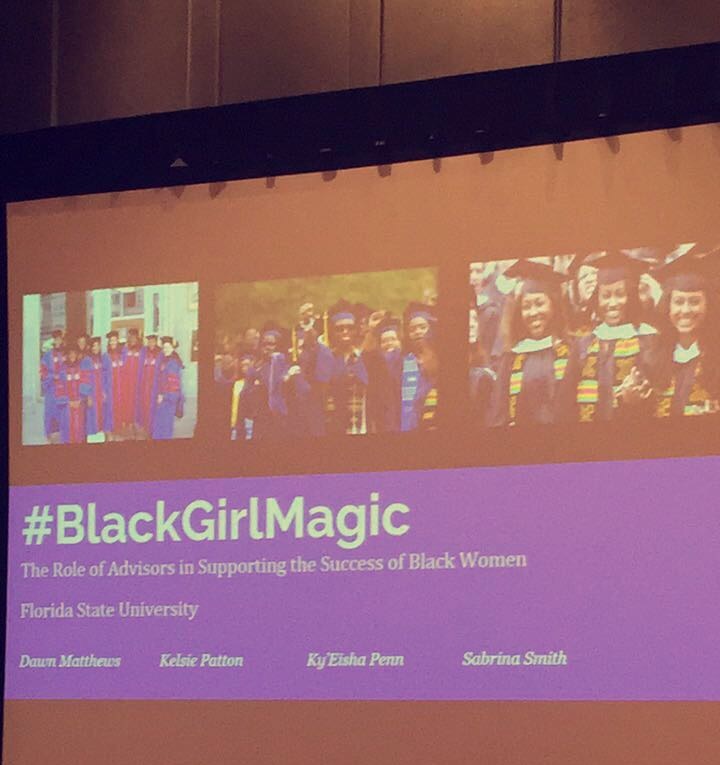Shavonne Holton was a recipient of a PACADA professional development grant for the 2016 year. She used her funds to attend the 2016 NACADA National Conference in Atlanta, GA. See below for more information about her experiences!
2016 NACADA Annual Conference – Advising To Learn in Atlanta, GA
Atlanta, affectionately known as Hotlanta, was the host city for the 2016 NACADA Annual Conference. Not only were the themes and content of the sessions hot and trendy in advising, but the rooms were packed with eager practitioners! Many sessions were in demand requiring ad hoc accommodations and overflow sections for the participants who did not want to miss the valuable insights shared by the presenters.
I was fortunate to attend this conference with assistance from the PACADA grant. I enjoyed networking with advisors from every region and learning strategies that would take my practice to the next level. Three of the most impactful sessions are included below.
Student Stressors and Pressures: Navigating the Global Mental Health Epidemic on Campus

Susan Toler Carr is a professional engineer and founder of the Justin Carr Wants World Peace Foundation. Carr became aware of the lack of attention given to mental health issues when she lost her son, Justin, due to an undetected medical condition at the age of seventeen. It was during this time that she inquired about some of Justin’s surviving friends only to find that some of them had a difficult time grieving his loss. Since then, Susan has made it her mission to spread awareness and advocate for the mental health of adolescents and young adults.
During her workshop, Carr elaborated on a plethora of conditions and circumstances that plague today’s pre-college and college-aged students. For instance, she redefined the non-traditional student to include students who grew up in adverse conditions, are a part of veteran/military families, and consider themselves socially isolated amongst other things. One recommendation she shared was to enhance student ID cards to include counseling and crisis hotline numbers on the back. She stated that some institutions have already implemented it and have found it to be successful.
What I appreciated most about her session was that it was a great reminder to look up from the demands of our work to be present with our students. It is only natural to be preoccupied by the countless emails we receive and our never-ending task lists. Sometimes the most effective strategy for student success is to be present, which demonstrates that we care for our student’s well-being.
#BlackGirlMagic : The Role of Advisors in Supporting the Successes of Black Women
During this workshop, Dawn Matthews, Kelsie Patton, Ky’Eisha Penn, and Sabrina Smith of Florida State University used Critical Race Feminism and Womanist Identity Development theories to provide a framework for advising Black women in higher education. Critical Race Feminism acknowledges the various groups within a marginalized population. The Womanist Identity Development Model specifically illuminates the experiences of African American women to provide a more accurate perspective of their experiences.
During the session, the presenters shared various stereotypes that Black women at both Historically Black Colleges and Universities and predominately White institutions identify with including “being the only/tokenism”. By the end of the session, we learned more about the advising styles that work best for the success of Black Women including developmental advising which focuses on helping students define goals through collaboration with their advisor. Another recommended style was proactive advising. In it, the advisor initiates contact with the student during critical points or circumstances including if the student is high risk, on probation, high achieving, and other critical milestones throughout their academic career.
This particular workshop won Best of Region 4. With the number of practitioners that filled the large breakout room for this session at NACADA, it was clear the level of need and interest in this issue. Attendees from all ethnic and gender backgrounds were engaged in the critical conversations that took place. Even as a professional who identifies with #BlackGirlMagic, I found my biggest takeaway was to assess and approach each student according to her unique needs.

ATL: It’s HOTlanta: Don’t Burn Out
Presented by: Wiona Porath and Robert Detwiler (Siena Heights University), Jaimie Newby (University of Illinois – Springfield), Dana Hebreard (Calvin College)
With the many demands in our work, it is difficult to know when to turn down a project. It can feel as if everything is a priority even if it is a distraction. We all know that trying to manage a student load, committee work, participating in professional organizations, adjusting to curriculum changes, and other duties as assigned can lead to burn out. What is even more disheartening is that you can unknowingly lose the zest for the work you once found meaningful to you.
During this session, the presenters gave some of the signs of burn out including a change in sleeping and appetite, developing cynicism about your job, and finding it difficult to ease into the workday. Although I am in my second year as an academic advisor, I could see how our work could become less fulfilling as compared to the first day on campus or in a new role.
The presenters did well at reminding the attendees about the most powerful word ever: No. They stressed the importance of establishing boundaries with students, colleagues, and supervisors to prevent burnout. They also shared tips for incorporating relaxation into the workday and in life to create harmony. Some recommendations included taking your lunch outside of the office, going for walks, being present and more. Though the presentation covered signs you may have heard before, it definitely made me more aware of my own professional limitations and I can manage them when I returned to Purdue.
Overall, attending the NACADA annual conference gave me the opportunity to meet some amazing presenters, reinforce what I was doing well in my current role at Purdue, and introduced me to some new perspectives on advising. Thank you PACADA!
